

Task for 3-5 Grades - Money as You Learn. Money as You Grow – Kids and Money – President's Advisory Council on Financial Capability. ZIONS Odd-Lot. Elementary and Middle School. Take Charge America. Personal finance skills, like reading, writing and arithmetic, need to be taught at a young age.
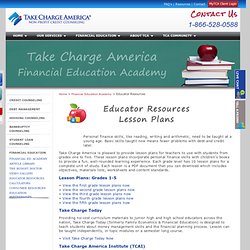
Basic skills taught now means fewer problems with debt and credit later. Take Charge America is pleased to provide lesson plans for teachers to use with students from grades one to five. These lesson plans incorporate personal finance skills with children's books to provide a fun, well-rounded learning experience. Each grade level has 10 lesson plans for a complete unit of study.
Each lesson is a PDF document that you can download which includes objectives, materials lists, worksheets and content standards. Lesson Plans: Grades 1-5 » View the first grade lesson plans now» View the second grade lesson plans now» View the third grade lesson plans now» View the fourth grade lesson plans now» View the fifth grade lesson plans now Take Charge Today » Visit Take Charge Today Now Take Charge America Institute (TCAI) » Visit TCAI Now.
You Can BANK on This! (Part 1) Free Online Economic And Personal Finance Lesson Search. A Perfect Pet. 10 Reasons Why Schools Should Be Teaching Financial Literacy To Our Kids. Thanks to guest writer Krisca C.
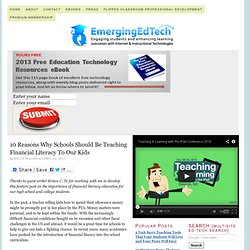
Te for working with me to develop this feature post on the importance of financial literacy education for our high school and college students. In the past, a teacher telling kids how to spend their allowance money might be promptly put in her place by the PTA. Money matters were personal, and to be kept within the family. With the increasingly difficult financial conditions bought on by recession and other fiscal challenges in the US and abroad, it would be a great time for schools to help to give our kids a fighting chance. In recent years, many academics have pushed for the introduction of financial literacy into the school curriculum. The need to educate our kids about money is simply greater than ever.
They don’t know enough. These resources provide support for, and excellent reading on, many of the above issues: What do you think? Krisca C. About Kelly Walsh Print This Post. Money Lessons: A Guide to Financial-Literacy Resources. Helping your students get a handle on finance doesn't have to take up a big chunk of your school year, especially if you have the right lessons at your fingertips.
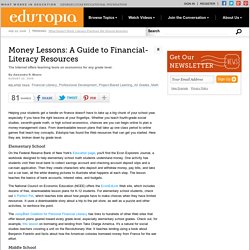
Whether you teach fourth-grade social studies, seventh-grade math, or high school economics, chances are you can begin online to plan a money-management class. From downloadable lesson plans that take up one class period to online games that teach key concepts, Edutopia has found the Web resources that can get you started. Here they are, broken down by grade level. Elementary School On the Federal Reserve Bank of New York's Education page, you'll find the Econ Explorers Journal, a workbook designed to help elementary school math students understand money.
The National Council on Economic Education (NCEE) offers the EconEdLink Web site, which includes dozens of free, downloadable lesson plans for K-12 students. Middle School High School Create Your Own. Great-West Great-Teachers. Personal Financial Education Program Overview Whether it’s called financial literacy or money management, young people need to know how to balance a checkbook, save for future needs and get the most for their money.
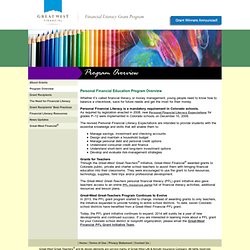
Personal Financial Literacy is a mandatory requirement in Colorado schools. As required by legislation enacted in 2008, new Personal Financial Literacy Expectations for grades P–12 were implemented in Colorado schools on December 10, 2009. The revised Personal Financial Literacy Expectations are intended to provide students with the essential knowledge and skills that will enable them to: Manage savings, investment and checking accounts Design and maintain a household budget Manage personal debt and personal credit options Understand consumer credit and finance Understand short-term and long-term investment options Develop and evaluate risk-management strategies Great-West Great-Teachers Program Continues to Evolve In 2013, the PFL grant program started to change. Free Online Money Management Game for Kids with Real Monetary Rewards.
Welcome to an online money management adventure for kids as they travel to MoneyIsland!
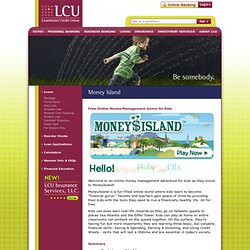
MoneyIsland is a fun-filled online world where kids learn to become "financial gurus. " Parents and teachers gain peace of mind by providing their kids with the tools they need to live a financially healthy life. All for free. Kids can even earn real-life rewards as they go on fantastic quests to places like Atlantis and the Eiffel Tower. Kids can play at home or entire classrooms can embark on the quests together. Summary For kids ages 8 to 14Free, multi-level online gameTeaches valuable financial skillsReal-life monetary rewards built into gameParents and teachers can track progress and assist in learningAdditional lesson plans/activities provided to adultsCan be used in classroom settingMeets national standards for financial education Rewards may include: Take the adventure and explore MoneyIsland today!